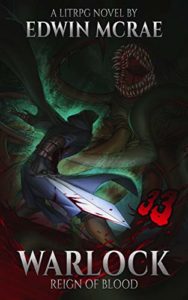Writing to meet readers’ genre expectations is part of marketing your book. In this article, Edwin McRae breaks down the steps he uses to find a genre and sub-genre that will suit each writer perfectly.
 Fiction sub-genres are legion. Under science fiction alone you’re looking at well over thirty different sub-genres, from post-apocalyptic through to robots.
Fiction sub-genres are legion. Under science fiction alone you’re looking at well over thirty different sub-genres, from post-apocalyptic through to robots.
And then you have your sub-sub-genres like robot apocalypse! So here’s the challenge.
My chosen sub-genre is LitRPG. How do you pick the right sub-genre for you?
Actually, this challenge can be broken down into two sub-challenges.
A. How to pick a sub-genre you’re going to enjoy writing.
B. How to pick a sub-genre that will financially sustain your writing.
Let’s get this out of the way from the outset.
TIP: Spreading yourself across genres isn’t a great idea, especially when you’re starting out.
I can speak from experience on this one. I’ve hopped from cyberpunk to weird west to comic fantasy. Those three books have all sunk without a trace.
Why? Because I didn’t understand each book’s sub-genre before writing it and I didn’t stick around long enough to make a name for myself in that sub-genre.
Okay, so let’s hone in on Sub-challenge A, how to pick a sub-genre you’re going to enjoy writing.
Step One – Make Lists
TIP: Make a list of your fiction interests and your current knowledge base.
This is a vital first step in finding the right niche for you. Here are my lists:
Interests
- Dark, gritty fantasy
- RPG video games
- Cybernetics
- Artificial Intelligence
- Virtual Reality
- Lovecraftian monsters
- Fighter-mages
Knowledge Base
- Lifelong reader of dark fantasy
- Professional narrative designer for video games
- Extensive reading in the cyberpunk genre
- Bachelor of Psychology (knowledge of neuroscience and brain anatomy)
Actually, my full lists are much longer and include things like pick-a-path books and life as a high school drama teacher, but for this article, I’ve just picked out the elements that are pertinent to LitRPG.
Your Interests list is there to show you which sub-genres you’re going to enjoy writing in. Your Knowledge Base list is there to show you which sub-genres you can start writing in straight away, without the need for a ton of research and upskilling beforehand. Yes, we’re talking about the old “write what you know” adage here.
TIP: Take the keywords from your Interests list, put them into the Amazon Kindle search, and see what pops up.
 Also, once you have you an Interests list, you’ll be better prepared to spot sub-genres that simply pop up on your radar. My own ears pricked up regarding LitRPG when Chris Fox mentioned it on Joanna’s podcast.
Also, once you have you an Interests list, you’ll be better prepared to spot sub-genres that simply pop up on your radar. My own ears pricked up regarding LitRPG when Chris Fox mentioned it on Joanna’s podcast.
Chris Fox is the author of Write to Market. It was Chris’ book that gave me the tools to research the financial viability of LitRPG as a sub-genre. I can’t honestly recommend Chris’ book more if you’re determined (like me) to make your living as a sub-genre writer.
“A great example is LitRPG, which features characters trapped within MMOs (massively multiplayer online role-playing games). A lot of indie science fiction and fantasy authors, who are also gamers, got into this niche quickly, writing books to this market and some of them did incredibly well.” – Chris Fox
Step Two – Read Lots
TIP: Read a popular example of the sub-genre.
I know, pretty obvious recommendation, but I’m offering it because I’ve made this mistake myself. I co-wrote a weird west book without ever reading a novel in the weird west sub-genre. Not surprising then that I missed so many of the marks that weird west readers are looking for.
To find a popular LitRPG, I went to the Amazon Kindle store, put LitRPG in the search box and from the results picked the book with the most ratings. If you don’t know the specific name of your possible sub-genres yet, just put in keywords from your Interests list.
At the time of my LitRPG search (over a year ago), the most highly-rated book happened to be Aleron Kong’s The Land: Founding: A LitRPG Saga (Chaos Seeds Book 1). And yes, lengthy titles are a bit of a LitRPG trope.
I read it, and while I wasn’t all that rapt with the story or the writing style, I totally fell in love with the form. Now begins the journey of self-understanding.
TIP: If you find a sub-genre that you ‘zing’ with, check back with your Interests and Knowledge Base list to see if it’s a niche you’ll enjoy writing for and can start writing for in straight away.
For me, LitRPG ticked several boxes in Interests…
- RPG video games
- Cybernetics
- Artificial Intelligence
- Virtual Reality
…and a couple more in Knowledge Base.
- Professional narrative designer for video games
- Extensive reading in the cyberpunk genre
Great. Looked like I’d found a genre I could write in but also enjoy writing in the process.
But now for the most important step if you want to make a living out of writing sub-genres.
Okay, so let’s hone in on Sub-challenge B, how to work out if your chosen sub-genre is potentially profitable.
Step One – Money Talks
TIP: Find out if authors are making money in your chosen sub-genre.
 Here’s where I followed Chris Fox’s advice. I looked at the Kindle Rankings on Amazon to see how well LitRPG books were doing in the sales charts.
Here’s where I followed Chris Fox’s advice. I looked at the Kindle Rankings on Amazon to see how well LitRPG books were doing in the sales charts.
Kindle Rankings are easy enough to find. Make sure you’re in the Kindle Store, search up the book you want to check out, simply scroll down from the Book Description, go past “Sponsored products”, and you’ll hit “Product details”. Then have a look at the “Amazon Bestsellers Rank”.
Here’s a LitRPG example I found recently, on the 7th of October, 2018.
Advent (Red Mage Book 1) by Xander Boyce
#301 Paid in Kindle Store
Okay, clearly this book is doing really well but I want to know exactly how well in terms of dollars and cents. So I take that 301 and plug it into Dave Chesson’s Kindle Bestseller Calculator. And this is what I get.
331 book sales per day! At a per book price of $5.69, Xander is earning $1883.39 per day from Kindle sales. Once we take away the 30% commission from Amazon of $565.01, Xander is left with a take-home gross income of $1318.37 per day.
Yes, Xander Boyce is doing very well indeed!
And these figures also show that LitRPG is a popular genre with plenty of people willing to pay money to read it. However, you can’t base your decision on just one book.
What if it’s a rogue, one-hit wonder?
TIP: It’s best to repeat the above sequence with a dozen or more books in the sub-genre to get a feel for how the broader field is doing.
I took Chris Fox’s advice again and tracked the rankings for a selection of LitRPG books over the course of a few months to see how they continued to perform well over time. The result was that I saw a number of authors doing financially well over an extended period of time.
Yes, LitRPG looked to be a financially viable sub-genre for me.
Step Two – Audience Expectations
Sub-genres are so tightly defined by conventions and tropes because that’s what the readers want. Yes, readers are also open to having those conventions and tropes challenged and subverted. They’re open to seeing their sub-genre progress, become more sophisticated. But innovations still need to be within the firm confines of the sub-genre.
TIP: Immerse yourself in the sub-genre.
I embarked on a campaign of reading, absorbing LitRPGs from the center of the genre (Fantasy Sagas inspired by Skyrim and World of Warcraft) to LitRPGs on the edge of the genre (Zombie Apocalypse and Real-Life RPG).
TIP: Listen to sub-genre fans on social media.
I also took note of the following LitRPG communities on:
- Discord
- Goodreads
- LitRPG Forum
I got a feel for LitRPG fan preferences:
- What they were enjoying and not enjoying.
- What they hoped for and what they were bored with.
- What they were impressed by and what was frustrating them.
TIP: Write your own definition of the sub-genre.
Then I wrote my own definition of LitRPG based on what I’d read and absorbed from the communities. This is it.
LitRPG aka “Literary Role-Playing Games” is a subgenre of fiction where the protagonist spends the bulk of the story playing some form of roleplaying game. For instance, the main character might be a wizard in a High Fantasy session of Dungeons and Dragons, a space pirate in a science-fiction MMORPG or even a zombie in a survival horror RPG.
The most common setting is a full-immersion virtual reality RPG where smell, touch, and taste are as much a feature as sight and sound.
During their in-game story, the protagonist will interact with other players and/or NPCs (non-player characters), will complete quests, gain experience points, build up a repertoire of skills and spells in their chosen character class, and generally do all of the stuff you’d expect to see in an RPG video game or tabletop roleplaying game.
I fully expect to rewrite this definition many times as the sub-genre develops, but for now, it’s my touchstone.
Step Three – Writing to Market
 I totally understand that not everyone can do this. The “write for yourself” strategy is totally valid. But here’s where the final and biggest box needs to be ticked before you spend however many months writing your chosen sub-genre novel.
I totally understand that not everyone can do this. The “write for yourself” strategy is totally valid. But here’s where the final and biggest box needs to be ticked before you spend however many months writing your chosen sub-genre novel.
TIP: If you find you simply clam up when you think about all those readers and what they’re expecting from your book, then that’s a sure sign that you’ve chosen the wrong sub-genre.
Personally, I’m happy to meet most LitRPG reader expectations because it’s the sort of stuff I love writing anyway.
That said, I have spotted a few expectations that I won’t be pandering to. Harem is one. The mass slaughter of wildlife for resources and XP is another. Thankfully, these don’t seem to be deal breakers for the majority of LitRPG readers, so I don’t have to write anything I don’t feel comfortable with just to keep my audience happy.
And honestly, that was my biggest reservation about ‘writing to market’. In my previous life as a soap opera storyliner, I had to roll with plenty of stories I felt morally opposed to. It got too much for me in the end. Hence I don’t do that anymore.
I only write what I feel happy about writing, and I’ve found a sub-genre in LitRPG that allows me to do that.
Still, whenever I need to make narrative decisions about the LitRPG novel I’m writing, I do check in with my most up-to-date LitRPG definition to make sure that what I’m planning to write fits with the audience’s expectations.
If it doesn’t then I either ditch that idea or come up with a really good reason why this innovation is progressing the sub-genre and will be welcomed by the audience.
Conclusion
 And that’s how I’ve ended up writing Warlock: Reign of Blood, a dark fantasy LitRPG which I published in October 2018. Regardless of how well Warlock does, I’ve thoroughly enjoyed writing Warlock and actually found the confines of the genre to be more inspiring than limiting.
And that’s how I’ve ended up writing Warlock: Reign of Blood, a dark fantasy LitRPG which I published in October 2018. Regardless of how well Warlock does, I’ve thoroughly enjoyed writing Warlock and actually found the confines of the genre to be more inspiring than limiting.
There’s something wonderful about having clear boundaries within which to create your narrative magic. Nothing terrifies me more than ‘infinite possibility’. That sort of thinking just makes me want to go play video games. 
I hope you’ve found this useful and that you too find a fun and prosperous niche to write for.
My parting thought would have to be this.
Finding your sub-genre is a match made in heaven. Writing tastes meet reading tastes. I sincerely hope you find yours. 
Have you considered writing to market? Please leave your thoughts below and join the conversation.
 Edwin McRae is a science-fiction writer and senior narrative designer for the video games industry. He has fallen in love with LitRPG, a sub-genre that combine his twin passions of cyberpunk and video games.
Edwin McRae is a science-fiction writer and senior narrative designer for the video games industry. He has fallen in love with LitRPG, a sub-genre that combine his twin passions of cyberpunk and video games.
